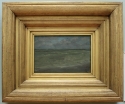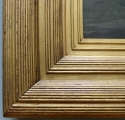The Paintings of James McNeill Whistler
YMSM 518
Green and Silver: The Great Sea

Date
Green and Silver: The Great Sea probably dates from Whistler's sojourn in Pourville in July and August 1899. 1

Green and Silver: The Great Sea, The Hunterian
It was probably the 'Sea piece - Pourville' listed by Whistler's ward, Rosalind Birnie Philip (1873-1958), among the small panels in Whistler's studio at 8 Fitzroy Street on 16 February 1901. 2
Images

Green and Silver: The Great Sea, The Hunterian

Green and Silver: The Great Sea, The Hunterian

Green and Silver: The Great Sea, frame detail
Subject
Titles
Possible titles include:
- 'Green and Silver – The Great Sea' (1901, ISSPG). 3
- 'La Grande Mer: Pourville' (1915, Colnaghi). 4
- 'La Grande Mer – Pourville' (1935, Colnaghi). 5
- 'Green and Silver: The Great Sea' (1980, YMSM). 6
The 1980 title is based on that of 1901 with punctuation adapted to be consistent with other titles.
Description

Green and Silver: The Great Sea, The Hunterian, Glasgow
A seascape in horizontal format. A stormy green sea breaks on the grey/brown beach, under a bright cloudy sky, with patches of turquoise blue.
Site
The beach at Pourville-sur-mer on the French coast, a popular holiday resort and port, where Whistler was staying with his in-laws, the Birnie-Philips, at the Pavillon Madeleine.
Technique
Technique

Green and Silver: The Great Sea, The Hunterian, Glasgow
It was painted robustly on an unprimed panel, with a partial, mid-brown imprimatura thinly applied with uneven diagonal brushstrokes. This is very similar in tone to the painted brown shore and is used as a dark tone in the clouds. The paint has megilp-type medium modifier in the sea only. The sea was painted with a tiny brush in the background and a broader (5 mm) brush in the foreground. The brushwork on the sky is soft and fluffy. Both the rolling waves and the lower clouds were reworked. 7
Although there are touches of blue in the sky the panel is dominated by shades of grey, mixed with brown on the beach, and green (as noted in the title) for the sea.
The Sea, Pourville, No. 1 y516 and Green and Silver: The Great Sea y518 are similar in colour, composition and technique.
Conservation History
Dr Joyce H. Townsend examined the frame with assistance from Robert Armstrong of the Hunterian. She describes it as follows:
'The support is a panel with auxiliary backing panel of mahogany-type hardwood with a steep bevel on all four sides at the reverse, giving a maximum combined thickness of ca 12 mm instead of the 6-8 mm of most other framing devices. The [backing panel] .. looks more early 20th-cenury in design than others: this has very narrow battens ca 3 mm wide and, in plane with the picture, fastened with pins (one near the end of each strip) as well as adhesive, and arranged so that the end of one overlaps the next, to give offset squared, not mitred, corners. Three nails apparently go into the panel from the front, placed before painting. ...The varnish is glossy, very yellowed, and presumably not original. It was applied after the right batten went on, since some has piled up against the batten.' 8
Frame

Green and Silver: The Great Sea, The Hunterian

Green and Silver: The Great Sea, frame detail
Grau-style frame, dating from the 1890s or early 1900s. 9
History
Provenance
- 1903: in Whistler's studio at his death and bequeathed to his sister-in-law Rosalind Birnie Philip (1873-1958);
- 1935: given by Miss Birnie Philip to the University of Glasgow.
Exhibitions
- 1901: 3rd Exhibition, Pictures, Drawings, Prints and Sculptures, International Society of Sculptors, Painters and Gravers, Galleries of the Royal Institute, London, 1901 (cat. no. 36) as 'Green and Silver – The Great Sea'.
Grey and Silver: Pourville y522 and Green and Silver: The Great Sea y518 were described in 1901 as 'notes of the shifting light and colour of sea and sky' and 'pleasant little studies of the sea.' 10 The Glasgow Herald on 5 October 1901 wrote that they were 'true in tone' and 'weave an enchantment for us'. The British Architect admired the 'beautiful colour.' 11
By the terms of Miss R. Birnie Philip's gift to the University of Glasgow, it is not lendable.
Bibliography
Catalogues Raisonnés
- Young, Andrew McLaren, Margaret F. MacDonald, Robin Spencer, and Hamish Miles, The Paintings of James McNeill Whistler, New Haven and London, 1980 (cat. no. 518), plate 331, as 'Green and Silver: The Great Sea'.
Authored by Whistler
- None.
Catalogues 1855-1905
- 3rd Exhibition, Pictures, Drawings, Prints and Sculptures, International Society of Sculptors, Painters and Gravers, Galleries of the Royal Institute, London, 1901 (cat. no. 36) as 'Green and Silver – The Great Sea', repr.
Newspapers 1855-1905
- Anon., 'International Art Show in London', Glasgow Herald, Glasgow, 5 October 1901.
- Anon., 'International Society', Chronicle, London, 5 October 1901.
- Anon., ' "International" Exhibition', Morning Post, London, 7 October 1901, p. 6.
- Anon., 'International Society', London Evening Standard, London, 5 October 1901, p. 2.
- Anon., 'The International Society', Chronicle, London, 10 October 1901.
- Anon., 'Art Notes', Illustrated London News, London, 12 October 1901, p. 3.
- Anon., 'Royal Institute Galleries. The International Society', Daily News, London, 12 October 1901, p. 6.
Journals 1855-1905
- 'The International Society of Sculptors, Painters and Gravers', British Architect, 11 October 1901.
Monographs
- None.
Books on Whistler
- Enaud-Lechien, Isabelle, James Whistler, le peintre et le polémiste (1834-1903), Courbevoie, 1995, pp. 172-73, repr.
- Taylor, Hilary, James McNeill Whistler, London, 1978, pp. 149-51, repr. pl. 99.
Books, General
- None.
Catalogues 1906-Present
COLLECTION:
- Hopkinson, Martin J., James McNeill Whistler at the Hunterian Art Gallery, University of Glasgow, Glasgow, 1990, pp. 52-53, repr.
EXHIBITION:
- Loan Exhibition of Works by James McNeill Whistler to aid the Professional Classes War Relief Council, Messrs Colnaghi, London, 1915 (cat. no. 16) as 'La Grande Mer: Pourville'.
- James McNeill Whistler, University of Glasgow, Glasgow, 1935 (cat. no. 4).
Journals 1906-Present
- None.
Websites
- The Hunterian website at http://collections.gla.ac.uk.
- ArtUK website at https://artuk.org.
Unpublished
- Revillon, Joseph Whistler, Draft Catalogue Raisonné of the Paintings of J. McN. Whistler, [ca 1945-1955], Glasgow University Library (cat. no. 401).
Other
- Parkerson, Sarah Lawrence, Variations in Gold: The Stylistic Development of the Picture Frames used by James McNeill Whistlers, PhD thesis, University of Glasgow, 2007.
Notes:
1: YMSM 1980 [more] (cat. no. 518).
2: GUL BP II Ledger c, pp. 5-6.
3: 3rd Exhibition, Pictures, Drawings, Prints and Sculptures, International Society of Sculptors, Painters and Gravers, Galleries of the Royal Institute, London, 1901 (cat. no. 36).
4: Loan Exhibition of Works by James McNeill Whistler to aid the Professional Classes War Relief Council, Messrs Colnaghi, London, 1915 (cat. no. 16).
5: James McNeill Whistler, University of Glasgow, Glasgow, 1935 (cat. no. 4).
6: YMSM 1980 [more] (cat. no. 518).
7: Dr Joyce H. Townsend, Chief Conservator, Tate Britain, Report of examination, August 2017.
8: Townsend 2017, op. cit.
9: Dr S. L. Parkerson Day, Report on frames, 2017. See also Parkerson 2007 [more].
10: Chronicle, 5 October 1901; Morning Post, London, 7 October 1901. Press cutting album in Victoria and Albert Museum, pp. 6, 4.
11: 'The International Society of Sculptors, Painters and Gravers', British Architect, 11 October 1901.